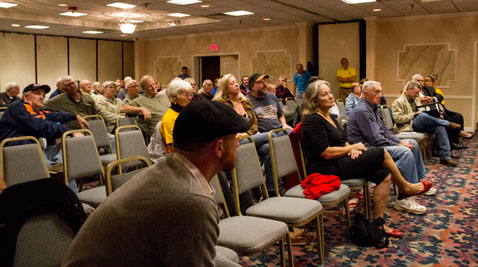HAGERSTOWN – Following the pledge of allegiance, a group of conservative Marylanders take their seats and listen to Delegate Neil Parrott, R-Washington County, who earnestly urges them to vote in the upcoming state elections.
“One thing we know is that elections have consequences and what we’re seeing at a national level is that Barack Obama has a total different worldview than we do here in this room,” Parrott said before the group of nearly 60 attendees of a Hagerstown T.E.A. Party meeting.

“He wants Obamacare — socialism. This is part of his new America,” Parrott said to the group, whose name stands for “Taxed Enough Already.”
President Obama is an unpopular figure among tea party conservatives, not only in Maryland, but across the nation.
“He just has socialist ideas. He thinks you and I should give all of our money to the state and then they — the powers that be — are gonna best decide how we’re gonna live,” said Denny Stouffer, vice president of the Hagerstown T.E.A. Party and a licensed gun salesman.
Tea party supporters say the president’s economic policies are the reason they want him out of the White House, but political scientists argue their dislike of the President goes beyond tangible political issues to his race.
Alan Abramowitz, a professor of political science at Emory University, said racial resentment among tea party members is expressed through their hostility toward Obama, the nation’s first black president.
“It goes beyond just the economic issues,” Abramowitz said. “It’s a reaction against the trends the tea party dislikes. And that includes growing racial and ethnic diversity.”
“It’s not old fashioned racism exactly. It’s not like they want to bring back segregation. But there’s no question that there’s an element of hostility there,” he said.
According to survey data collected by American National Election Studies in 2010 and analyzed by Abramowitz, 55 percent of the Republican Party disliked Obama, compared to 90 percent of tea partyers who said they dislike Obama.
However, tea party supporters disagree racial hostility exists within their party.
Stouffer said, “I think those people are very much ill-informed or they’re just trying to spread a lie to demonize us because they see us as a threat to them and their power.”
And Parrott said, “It just doesn’t exist from what I’ve seen. There’s certainly no evidence of [racism].”
Parrott, who founded the Hagerstown T.E.A. Party in 2009, said he’s been to tea party rallies in Washington, D.C., and has never seen any racist attitudes among supporters.
The group did not use racist language or symbols at their meeting held at Hager Hall on Oct. 10.
However, photos of other tea party activists at rallies across the nation paint a different picture.
During the government shutdown, a protestor waved a Confederate flag — a symbol of the pro-slavery South — at a tea party rally in front of the White House.
House Democrats called on Republicans to condemn the gesture of waving the Confederate flag at the rally, where former Alaska Gov. Sarah Palin and Sen. Ted Cruz, R-Texas, were present. House Republicans have yet to do so.
In 2010 the NAACP issued a statement condemning extremist elements within the tea party using racist language in their signs and speeches.
According to the organization’s website, members of the Congressional Black Caucus reported racial epithets were hurled at them as they passed by a Washington, D.C., health protest in 2010.
Abramowitz said racial resentment is not universal among tea party supporters, but it is there.
Thomas Schaller, a political science professor at University of Maryland-Baltimore County, agrees.
“Not every tea party member or agenda item is motivated by or related to race, and I’m sure many tea party members have not a racist bone in their bodies. But empirical, survey-based evidence published by several political scientists…have documented racialized attitudes, stereotyping or racial hostility among white tea party members,” Schaller wrote recently in an email.
Both Schaller and Abramowitz said tea party supporters are smart enough not to express overtly racist attitudes.
Todd Eberly, an assistant professor of political science at St. Mary’s College, points to an attempt to portray Obama as Muslim during the 2008 election, as an example of racial resentment on the far right.
“To deny there’s some of that in there would just be disingenuous,” Eberly said.
At the same shutdown tea party protest where a Confederate flag was displayed in front of the White House, Larry Klayman, conservative political activist and founder of Freedom Watch, called upon the President to, “put the Quran down and get up off his knees and to figuratively come up with his hands out.”
However, Eberly says racial resentment has been expressed by the far left, too.
“On the left, there was some of that going on with President [George W.] Bush. People compared Bush to [Nazi leader Adolph] Hitler,” he said.
And recently, U.S. Rep. Alan Grayson, D-Fla., received national attention when his campaign sent out a fundraising email that featured an image of a burning cross and equated the tea party to the Ku Klux Klan.
Abramowitz said extreme views expressed by both parties are the result of the electoral bases of the political parties moving apart.
“Democratic and Republican electoral bases are becoming more distinctive, both in terms of social characteristics, particularly race, but also religious beliefs. And then in terms of issues and ideology,” he said.
Abramowitz attributes this shift to partisan conflict causing the lack of compromise between the two political parties during the government shutdown.
Voters on the extreme end of the political spectrum, like tea party members, are more likely to be politically active and exert greater influence on their party, Abramowitz said.
“Without a Republican president you get a more open expression of some of these more extreme views. And I think that’s what we’re seeing,” he said.


You must be logged in to post a comment.